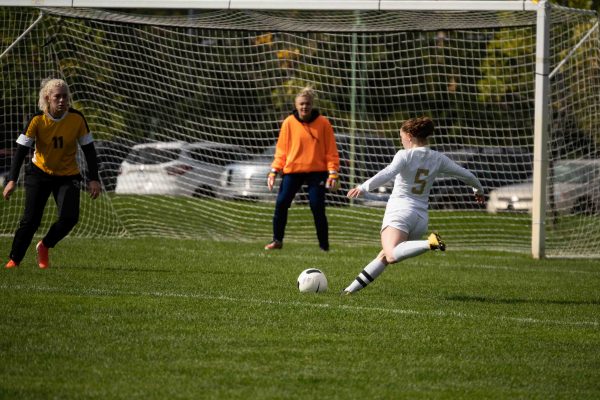
Hailey Donnellon shoots for a goal in a recent game against Mott Community College. Eric Le | Washtenaw Voice
By Kristy King
Staff Writer
Community college athletics and university athletics correlate a lot more than people might think. Community college could provide extra time for a sports player to develop their skills, become more financially responsible, develop a larger platform for recruitment or even to rehabilitate after an injury. The recruitment list is long, but WCC athletes are getting on that recruitment list.
“I had torn my ACL, so my goal at the end of my two years at WCC was to work as hard as I could to be ready for a university to pick me up and play soccer for them,” said Hailey Donnellon, 20, a general education major transferring to Madonna University where she will play soccer.
When people hear the name Julian Edelman, they think of the New England Patriots, an MVP and a Superbowl Champion. What they might not know is that Julian wasn’t heavily recruited upon entering college—he really wasn’t recruited at all. Edelman went to play football at San Mateo, a community—or “junior”—college. However, that was the platform Edelman needed to get recruited by a university, which is what players at Washtenaw Community College are discovering.
“There is an opportunity to be recruited to play at bigger colleges or universities by playing club sports at WCC, which I don’t think students realize,” said Veronica Slayton, a former WCC soccer captain.
Edelman went to play quarterback at Kent State, which is part of the MAC conference, including teams such as Eastern Michigan University, Central Michigan University and Western Michigan University. There is a plethora of qualities that make community college athletes appealing to other four year coaches.
“Every year recruiting is different, so you have to readjust depending on your recruitment class, and sometimes it turns out better to put a junior college student on the roster to start them right away,” said Kim Berrington, head coach of men and women’s volleyball at Siena Heights University. “When I bring in a community college player, I don’t bring them in and have them sit on the bench. They’re typically a good fit for us; they’re starters.”
Coaches don’t bring a community college athletes to their school just because it’s a small recruitment class. Sometimes they need an upperclassmen who already understands college and can set the example for a “young team.”
“[Community college] players are older, they’re mature, more focused and they know time management,” said John Kolasinski, head baseball coach at Siena Heights University. “They’ve already made that adjustment to college.”
Sometimes coaches need community college players when they’re still building the program, which was the case at the University of Michigan-Dearborn.
“I intentionally wanted junior college kids in the beginning because they fit the roll as a student-athlete,” said Matt Cunningham, head baseball coach at University of Michigan-Dearborn. “They are already a leader, physically more developed and someone for the younger guys to look up.”
The former WCC baseball player, Victor Phillips, praises the wolfpack baseball team for helping him learn how to deal with failure, and for “restoring the itch” to play baseball again.
“It was a really good experience,” said Victor Phillips, 24, utility player for U-M-Dearborn baseball team. “I got a lot of reps which prepared me and kept me in shape. It taught me work ethic, time management, the ability to deal with a bunch of different personalities.”
Victor will graduate in the spring with a business administration and finance degree after playing three full seasons at WCC and one at U-M-Dearborn. He recalls a memorable experience at the Golden Grizzlies Classic—WCC won the game when Victor thought the team had no chance in sight. Victor said he would never forget that feeling because players lose a lot, but the feeling of a win is unforgettable.
“Baseball helps you in life because you get critical feedback and you learn the ability to take criticism, as well as to think on your feet,” Cunningham said. “Student athletics prepares you for success long beyond your playing days.”
From a financial standpoint, it makes sense for students to start at community colleges and transfer to a university later.
“Kids today are concerned about cost and debt coming out of school,” said Kolasinski. “They can do two years at a junior college and then come play for us for two years.”


